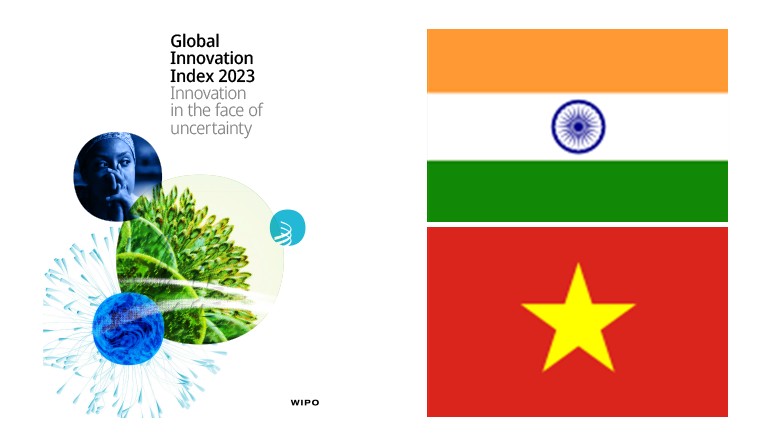Global Innovation Index 2023: India, Vietnam overperform for 13 consecutive years
10 November 2023

Photo: WIPO
For the 13th consecutive year, India and Vietnam have been overperforming on the innovation front, according to the 2023 Global Innovation Index (GII), recently released by the World Intellectual Property Organization.
Annually, the GII assesses the innovation performance of 132 countries based on innovation inputs and outputs. The index measures various factors – Institutions, Human Capital and Research, Infrastructure, Market Sophistication and Business Sophistication for the Innovation Input Sub-index, and Knowledge and Technology Outputs and Creative Outputs for the Innovation Output Sub-index.
According to the 2023 GII Report, 21 countries are performing above expectations relative to their economic development levels. Notably, India and Vietnam, considered as lower middle-income economies, ranked 40th and 46th in the GII. The bigger story is that both countries, alongside Moldova, have consistently overperformed for 13 years.
That said, India, Vietnam and Moldova are categorized as record-holders innovation-wise, with India and Vietnam among the top climbers of the decade, ranking 66th and 76th respectively in the GII in 2013.
-content_original.jpg)
Rachna Bakhru, Partner, RNA, Gurugram
India: Startups, knowledge capital, research critical factors
India ranks highest in Market Sophistication and Knowledge and Technology Outputs at 20th and 22nd, respectively.
According to the report, the sale of electric vehicles in the country has experienced substantial growth, increasing from 4 percent in 2012 to an impressive 14 percent in 2022. Notably, the electric three-wheeler market in India has flourished, constituting over half of the country’s three-wheeler registrations in 2022.
Rachna Bakhru, a partner at RNA in Gurugram, attributes India’s consistent innovation performance to its vast knowledge capital, dynamic start-up ecosystem and the commendable efforts of public and private research organizations.
During the pandemic, India effectively used innovation as a crucial weapon in fighting against the crisis. Bakhru emphasized the government’s proactive role, mobilizing domestic industries to address shortages in medical equipment. This initiative, driven by the Prime Minister’s call for “Atma Nirbhar Bharat,” which translates to self-reliant India, has significantly reshaped the entrepreneurial landscape in the country.
Bakhru also highlighted the influence of the digital revolution and government backing, emphasizing critical sectors like HealthTech and EdTech. These elements, combined with the flourishing Fintech landscape and growing focus on sustainability, have ignited the entrepreneurial drive in India during the pandemic.
“HealthTech and EdTech emerged as two promising domains with vast potential for innovation and growth. In the health sector, telemedicine, remote patient monitoring and health-related apps witnessed exponential growth. Similarly, the demand for online learning solutions skyrocketed in the education sector,” she said. Entrepreneurs seized these opportunities and created platforms, tools, services and other solutions to meet this growing demand.
Government initiatives and policy reforms also played pivotal roles in promoting innovation, most notably in the growing start-up ecosystem. According to the Ministry of Commerce and Industry, the number of recognized start-ups in India has passed the 50,000 mark, with nearly 1,500 start-ups added each year.
“The government’s push towards renewable energy and sustainable practices has also created avenues for young entrepreneurs to invest in clean energy start-ups, sustainable product manufacturing, waste management and eco-friendly technology,” added Bakhru.

Tuan Hung Nguyen, Senior Associate, Patents and Designs Division Manager, Aliat Legal, Ho Chi Minh
Vietnam: Innovation journey began in 2009
Vietnam ranks highest in Creative Outputs at 36th place.
According to Tuan Hung Nguyen, a senior associate and patents and designs division manager at Aliat Legal in Ho Chi Minh, the introduction of innovation in Vietnam began in 2009 with the Innovation Partnership Programme, the country’s first developmental partnership designed to support the national innovation system.
This was followed by the National Program 844 to “Supporting the National Innovation Initiative to 2025” launched in 2016. The program aims to create a favourable environment for the establishment and growth of start-up innovation enterprises.
Recognizing that science, technology and innovation must be prioritized, the government approved Strategy for Science, Technology and Innovation Development until 2030 in 2022. Nguyen explained that this comprehensive strategy guides innovation activities, emphasizing the formation of agricultural innovation systems (linked to agricultural economic models, production chains, value chains and high-value products) and the restructuring process in alignment with the Fourth Industrial Revolution.
The strategy focuses on attracting investments from large-scale enterprises in areas such as innovation, technology absorption and proficiency, especially in smart production and manufacturing technology. Additionally, it emphasizes the development of innovative management, business models and product innovation. He said these areas serve as the nucleus and help establish connections and networks to foster innovation in small- and medium-sized enterprises.
The strategy also aims to establish innovation systems linked with industrial clusters domestically and within global value chains, particularly in high-revenue industries with significant export value.
Nguyen added that the objective is to establish an innovation system associated with value chains, sectoral connectivity clusters and innovative startup ecosystems. This will be implemented in regions and localities with the necessary requirements, including skilled human resources for innovation, training and research institutions, and material and technical facilities in association with economic advantages of regions and localities.
To further enhance Vietnam’s innovation capability, the National Innovation Center (NIC) and a chip design centre were recently inaugurated at the Hoa Lac Hi-Tech Park near Hanoi. The NIC, with a total floor area of nearly 20,000 square meters, is expected to be the largest innovation facility in the country, providing incentives and attracting tech firms, start-ups and specialists, promoting technology transfer, R&D and commercialization.
Beyond strengthening Vietnam’s start-up and innovation ecosystem, the NIC also aims to enhance the country’s involvement in the global semiconductor supply chain.
- Espie Angelica A. de Leon






